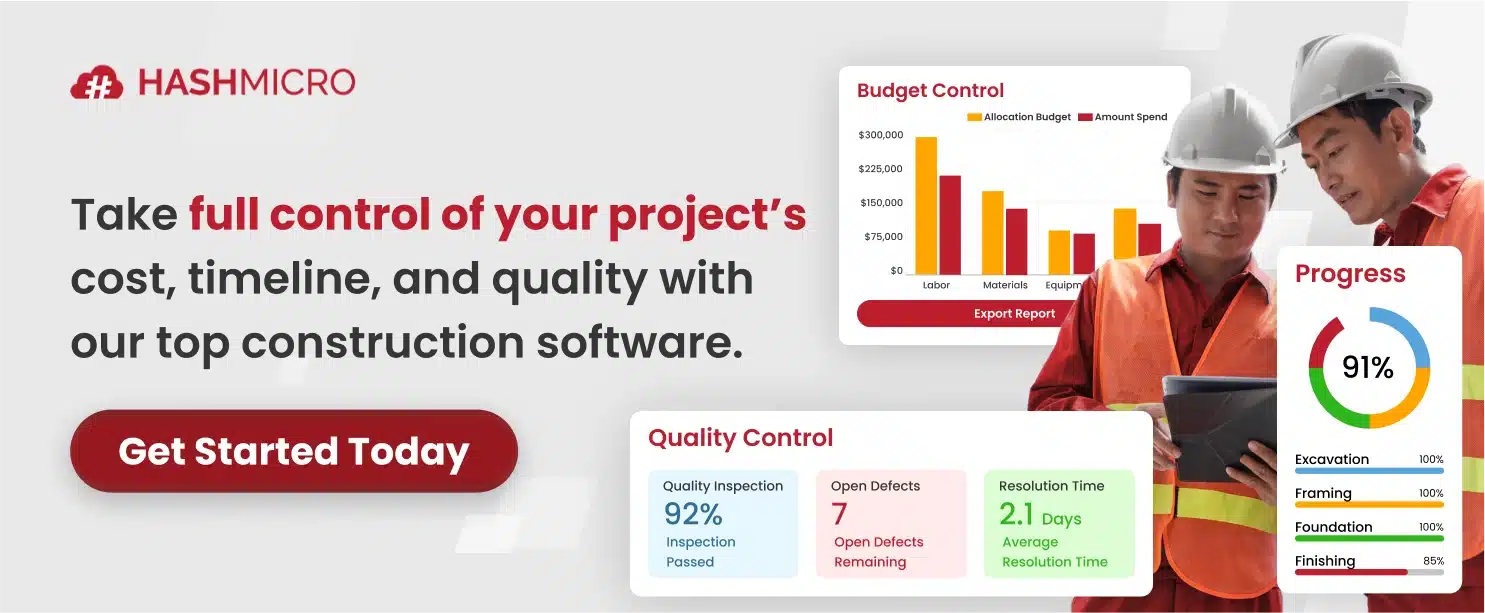When I first started managing construction projects, it often felt like juggling flaming torches. No matter how skilled my team was, keeping everything in sync manually was nearly impossible. That’s when I realized the difference the right ERP system could make.
With Construction ERP Software on board, I finally had a clear view of every project detail—from procurement and budgeting to workforce management, in one centralized platform. It didn’t just simplify coordination; it completely transformed how I managed projects.
If you’ve ever wondered what makes an ERP truly valuable for construction businesses, read on. Here are six essential features that can help you streamline operations, improve compliance, and keep every project under control.
Key Takeaways
|
What is a Construction ERP System?
A Construction ERP system is an integrated software solution designed to manage every aspect of a construction business, from project planning to financial management, inventory, and supply chain management.
It centralizes data across departments, allowing real-time collaboration, improved cost control, and better decision-making. By automating complex workflows, ERP software for construction companies helps contractors and developers complete projects on time and more efficiently.
Benefits of Using a Construction ERP System

Using a Construction ERP system offers numerous benefits for contractors and developers, such as:
- Increased efficiency: Automates repetitive tasks and streamlines workflows across departments.
- Improved financial control: Provides real-time visibility into project costs and budgets, leading to better cost management and profitability.
- Enhanced collaboration: Creates a single source of truth, ensuring all stakeholders have access to the same up-to-date information, which improves communication between the field and the office.
- Better decision-making: Provide data and analytics to help businesses make informed, data-driven decisions.
- Specific industry solutions: Built to handle the unique challenges of the construction industry, such as job costing and project-based accounting.
6 Essential ERP Features for the Construction Industry
1. Project management capabilities
Keeping track of multiple tasks, deadlines, and responsibilities can be a challenge in construction. With an effective construction software, everything gets centralized in one place for better oversight.
Your team benefits from real-time updates, ensuring everyone stays on the same page and projects run smoothly. Imagine less chaos and more control over every phase.
With advanced construction software integrated into your ERP, you can automate scheduling, track progress, and manage resources efficiently. This means fewer miscommunications and a smoother project flow.
So when you face your next big project, you’ll feel confident knowing that nothing will slip through the cracks.
2. Compliance and risk management tools
The construction industry continues to be one of the most heavily regulated sectors. This is because, for one, there are numerous safety standards that must be met to protect workers on-site.
With an effective ERP system, you can stay compliant with local regulations while managing risks effectively. Such systems often include features like automated compliance checks and real-time risk assessments on-site and on the road, making your job much easier.
In a recent article, Ryan Bradley, a seasoned truck accident lawyer in St. Louis, iterates that non-compliance with safety regulations can lead to serious legal consequences and hefty fines.
Having these tools in place not only safeguards your employees but also ensures that your projects remain within legal boundaries. This way you can focus on completing jobs efficiently without unnecessary interruptions or worries.
3. Procurement process optimization
Efficient procurement is essential for keeping construction projects on schedule and within budget. An ERP system streamlines this process by automating purchase orders, tracking inventory, and managing supplier relationships.
This ensures that materials arrive on time without unnecessary delays or cost overruns. Plus, you gain visibility into spending patterns and supplier performance, enabling better decision-making.
With optimized procurement processes in place, your projects run more smoothly from start to finish. Less hassle means more focus on building quality structures efficiently.
4. Workforce management solutions
Managing a diverse team across multiple sites can be daunting. A reliable ERP system simplifies this by providing tools for scheduling, tracking labor hours, and managing payroll efficiently.
With these capabilities, you can ensure that the right people are in the right place at the right time. It also helps monitor worker productivity and address any issues promptly.
By using construction software tailored for workforce management, you can automate timesheets, track employee performance, and even manage subcontractors seamlessly. This reduces administrative burdens and enhances overall efficiency.
Ultimately, having a robust workforce management system lets you enjoy the perks of ERP systems in construction: streamlined operations and enhanced project outcomes.
5. Budget tracking and financial reporting
Staying on top of your finances is crucial in the construction industry. An ERP system offers comprehensive budget tracking and financial reporting tools, giving you a clear view of project costs and cash flow.
These features help you manage expenses, forecast future spending, and ensure projects stay within budget. Detailed reports provide insights into financial performance, enabling better decision-making.
By maintaining tight control over your finances with an ERP system, you can complete projects more efficiently while maximizing profitability.
6. Integration with other software systems
Like most other sectors in the modern day, construction relies on various specialized software to function smoothly. Integrating your ERP system with tools like AutoCAD for design or QuickBooks for accounting enhances overall efficiency.
This connectivity allows seamless data sharing across platforms, reducing manual input and minimizing errors. Your team benefits from synchronized workflows and streamlined operations.
Embracing these integrations ensures you harness the full potential of your ERP system while leveraging other powerful software solutions in your daily tasks.
Here is a table summary that discusses six essential ERP features for the construction industry
| ERP Features | Description |
| Project management capabilities | Manage multiple tasks, deadlines, and teams in one centralized system. ERP software provides real-time updates, automated scheduling, and progress tracking, ensuring smoother workflows and better project control. |
| Compliance and risk management tools | Stay compliant with safety and legal standards through automated checks and real-time risk monitoring. ERP systems help minimize violations and ensure every project runs safely and legally. |
| Procurement process optimization | Streamline purchasing, track inventory, and manage suppliers effortlessly. With ERP automation, you reduce delays, control costs, and maintain complete visibility over your procurement process from start to finish. |
| Workforce management solutions | Simplify team coordination with tools for scheduling, payroll, and performance tracking. ERP software ensures the right people are in the right place while reducing administrative tasks and improving productivity. |
| Budget tracking and financial reporting | Monitor project costs, forecast expenses, and maintain cash flow with real-time financial insights. ERP systems help keep projects within budget and boost profitability. |
| Integration with other software systems | Connect your ERP with tools like AutoCAD or QuickBooks for seamless data sharing and reduced manual input. Integration streamlines workflows and enhances overall efficiency. |
Conclusion
Harnessing the right ERP features transforms how you manage construction projects, making operations smoother and more efficient. With real-time insights and centralized data, you can oversee every aspect of your project with greater accuracy and control.
From matters of compliance to procurement and workforce management, HashMicro’s Construction Software helps you navigate challenges confidently, enabling you to elevate your business.
HashMicro equips you with the capabilities needed for success in today’s competitive landscape. Want to experience the benefits of HashMicro’s Construction Software? Get a free demo now!
Frequently Asked Questions
-
What does ERP do for construction companies?
ERP software helps construction companies manage projects, budgets, inventory, and workforce in one integrated system, ensuring better control, efficiency, and profitability.
-
How can ERP improve project management in construction?
With real-time data and automated workflows, ERP allows project managers to track progress, monitor costs, and make timely decisions—reducing delays and cost overruns.
-
Is ERP suitable for small and medium construction firms?
Yes. Modern ERP systems are scalable and customizable, making them ideal for small and medium construction businesses that want to streamline operations and grow sustainably.


































